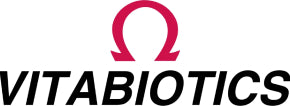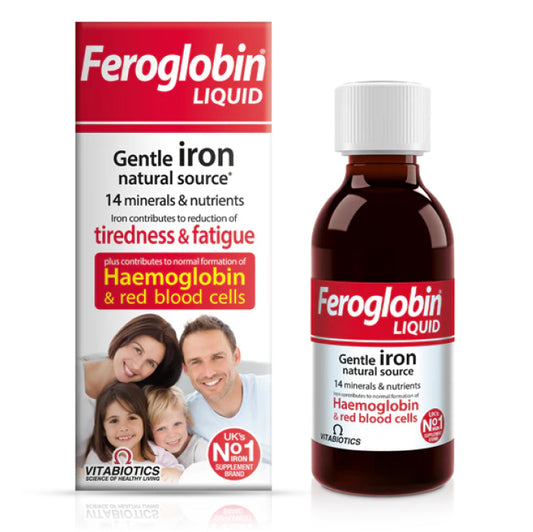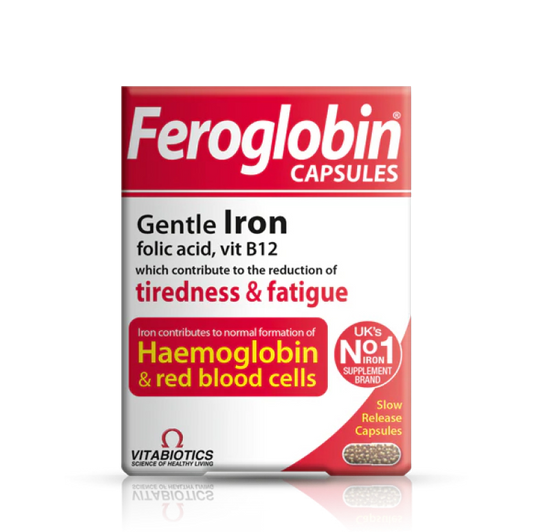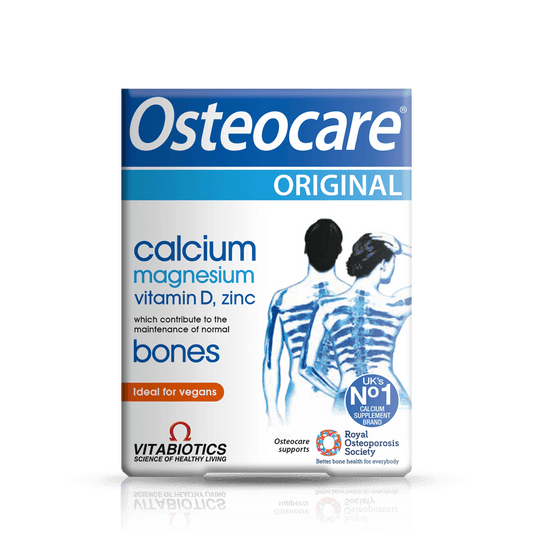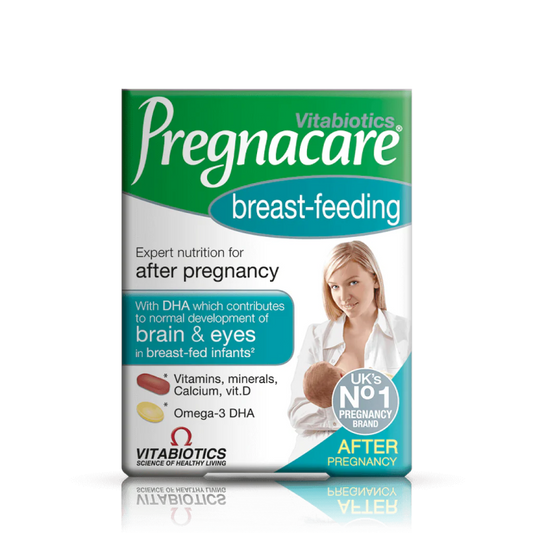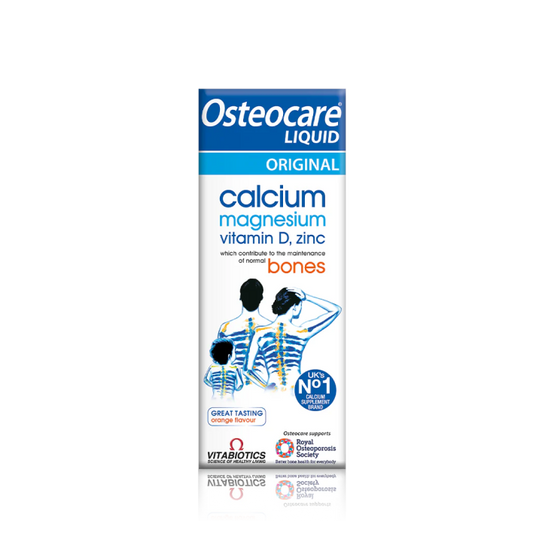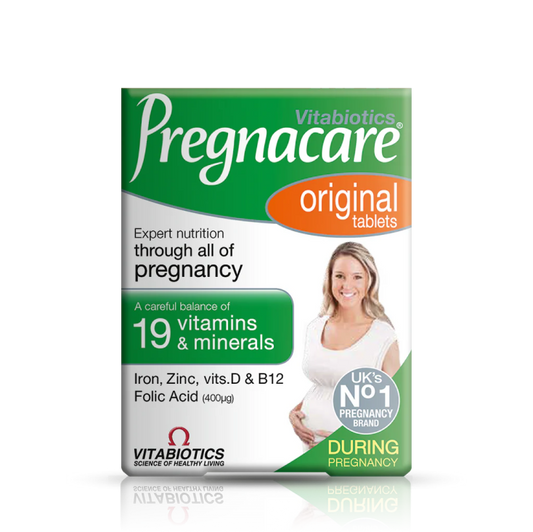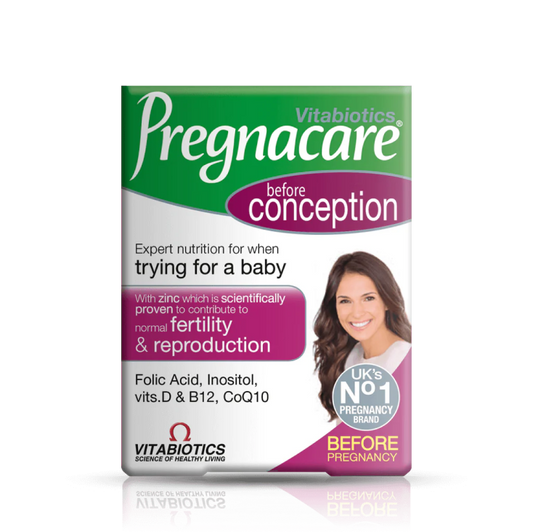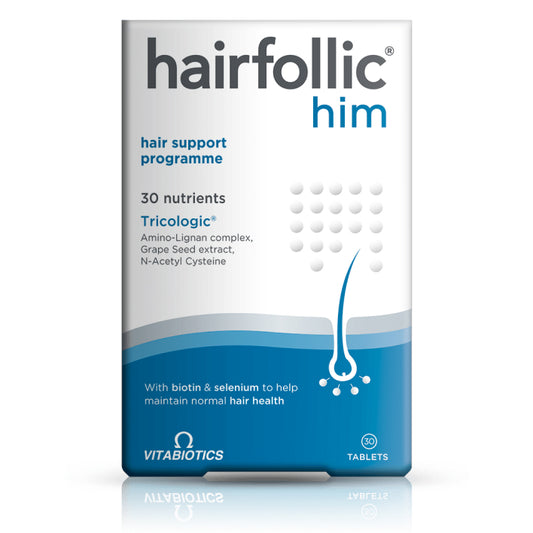Pregnancy is a special time in a woman's life - full of emotions, changes and challenges. The body works harder than ever before, and its needs grow with each passing day . That is why vitamins play a key role during pregnancy: they support the health of the mother-to-be and provide the child with the right conditions for development.
Although a balanced diet is essential, it is not always able to cover the increased demand for nutrients. In such cases, supplementation becomes not only helpful, but also necessary. The Polish Society of Gynecologists and Obstetricians (PTGiP) clearly emphasizes how important it is to provide the right vitamins and minerals at this special time.
During pregnancy, a woman's body undergoes a real metamorphosis - almost everything changes, from hormone levels to nutrient requirements. Some vitamins and minerals become absolutely crucial for the mother's health and the proper development of the child.
The most important vitamins and minerals during pregnancy are:
- Folic acid – essential for preventing neural tube defects in the fetus. Its deficiency can lead to serious developmental disorders.
- Vitamin D – supports the development of the baby's skeletal system and strengthens the mother's immunity. Its deficiency may increase the risk of preeclampsia.
- Iron – prevents anemia, which can lead to chronic fatigue, weakness and problems with fetal oxygenation.
- Iodine – crucial for the proper functioning of the thyroid gland and the development of the child's brain and nervous system.
Supplementation during pregnancy is not a fad, but a conscious decision that can have a real impact on your health and that of your child. It is worth consulting a doctor or dietician to:
- choose appropriate vitamin preparations,
- adapt the menu to individual needs,
- avoid nutrient deficiencies and excesses,
- provide optimal conditions for the child's development.
Only a conscious approach to diet and supplementation ensures that the body receives everything it needs during this demanding period .
And you? Have you considered which vitamins are most important to you at this time? Do your diet and supplements really meet the needs of your body and your developing baby? It's worth considering. Because health - yours and your child's - begins with wise, conscious choices .
The role of supplementation in pregnancy
Supplementation during pregnancy is not a fad, but real support for the health of a woman and her developing child . During this exceptional period, the body of the future mother works more intensively, and the demand for certain nutrients increases significantly. Even the best balanced diet may not cover all the needs of the body. That is why we reach for supplements - to replenish deficiencies of substances such as:
- folic acid,
- vitamin D,
- choline,
- vitamin B12,
- vitamin B6.
According to the recommendations of the Polish Society of Gynecologists and Obstetricians (PTGiP) from 2024, supplementation during pregnancy is not a luxury, but the foundation of health prevention. It has a beneficial effect not only on the child's development, but also on the health and well-being of the mother.
Why is vitamin and mineral supplementation necessary?
Vitamin and mineral deficiencies during pregnancy can lead to serious health complications – for both the woman and the developing fetus. Here are some examples:
- Folic acid deficiency – may result in neural tube defects in the baby.
- Insufficient iron – increases the risk of anemia and weakens the body's immunity.
- Low levels of vitamin D – may impair bone development and increase the risk of perinatal complications.
Proper supplementation is a conscious decision that can affect the health of the entire family . Sometimes it is these little pills that make the biggest difference.
Recommendations of the Polish Society of Gynecologists and Obstetricians (PTGiP)
PTGiP is an authority in the field of care for pregnant women in Poland . Their recommendations are based on current scientific research and are adapted to the realities of everyday life. What exactly do they recommend in terms of supplementation?
Daily supplementation should include the following ingredients:
- Folic acid – supports the development of the child's nervous system.
- Vitamin D – influences the proper development of bones and immunity.
- Choline – supports brain development and cognitive functions.
- B vitamins (B6 and B12) – support the nervous system and help maintain the mother's well-being.
Thanks to clear PTGiP guidelines, women can make informed decisions and adjust supplementation to their individual needs – without guessing, without stress.
This may be useful to you: Vitamins and supplements for pregnant women
Preconceptional supplementation and its importance
It is worth taking care of pregnancy even before it begins - this is the role of preconception supplementation . Folic acid is particularly important, the deficiency of which in the first weeks of pregnancy can lead to serious developmental defects.
PTGiP recommends starting folic acid supplementation at least three months before planned pregnancy.
It's a small step that can make a huge difference. Regularly taking folic acid:
- reduces the risk of neural tube defects,
- supports proper development of the embryo from the first days,
- prepares a woman's body for pregnancy,
- increases the chances of a healthy pregnancy from the very beginning.
For many women planning motherhood, reaching for the right supplements is the first, conscious step towards a healthy, peaceful pregnancy . And it is definitely worth taking.
The most important vitamins and nutrients during pregnancy
During pregnancy, a woman's body undergoes intense changes, adapting to the needs of the developing baby. Along with this, the demand for key nutrients that support the health of the mother and the proper development of the fetus increases. The most important include: folic acid, vitamin D, DHA, iodine, iron and B vitamins .
Every woman has different needs – lifestyle, diet and test results affect which supplements will be right for her. That is why supplementation should always be adjusted individually, preferably after consulting a doctor.
See also: What are the best supplements for women?
Folic acid and its active form (5-MTHF)
Folic acid plays a crucial role in the first weeks of pregnancy, supporting the proper closure of the baby's neural tube – a process that often occurs before a woman knows she is pregnant.
The recommended daily dose is 400–800 µg . Its active form – 5-MTHF, which is better absorbed, is increasingly recommended, especially in women with folic acid metabolism disorders. Thanks to it, you can more effectively support the development of the child's nervous system.
Vitamin D and its impact on bone development and immunity
Vitamin D supports bone development and immunity – both in the mother and the child. Its deficiency can lead to rickets in the newborn and weakening of the bones in the woman.
In our latitude, especially in winter, vitamin D deficiency is common, as its main source is UV rays. Therefore, supplementation of 1500–2000 IU per day is recommended.
DHA – a fatty acid that supports brain and vision development
DHA (docosahexaenoic acid) is an essential ingredient for the development of a child's brain and vision. Its appropriate level can affect the child's future cognitive abilities.
The recommended daily dose is at least 200 mg . The best sources are fatty sea fish and proven supplements.
Iodine – essential for the thyroid and nervous system of a child
Iodine is essential for the proper functioning of the thyroid gland, and therefore for the development of the child's brain and nervous system. Its deficiency can lead to serious neurological disorders.
The recommended daily dose is 150–200 µg. Women avoiding iodized salt or with thyroid problems should consult their doctor about the dose.
Iron – when and how to supplement
Iron is responsible for the production of hemoglobin and the transport of oxygen – which is particularly important during pregnancy. However, supplementation “in advance” is not recommended, because excess iron can be harmful.
The decision to supplement should be based on test results – ferritin level and blood count. It is worth remembering that vitamin C supports iron absorption, which is why they are often used together.
Choline – support for the fetal nervous system
Choline plays a vital role in the development of a baby's brain and spinal cord. Its deficiency can disrupt homocysteine metabolism, increasing the risk of pregnancy complications.
It occurs naturally in eggs and liver, but plant-based diets often do not provide enough of it. In such cases, supplementation may be necessary.
B vitamins: B6 and B12
Vitamins B6 and B12 support red blood cell production, energy metabolism, and nervous system function. Their deficiencies are more common in women on a vegetarian or vegan diet.
Vitamin B6 has an additional benefit – it can relieve morning sickness, which is a huge help for many expectant mothers.
Magnesium – for the nervous and muscular systems
Magnesium supports the nervous and muscular systems and regulates blood pressure. Its deficiency can manifest itself in calf cramps, insomnia or hypertension - especially in the third trimester of pregnancy.
If your diet does not meet your needs, magnesium supplementation is safe and recommended.
Calcium – the building block of bones and teeth
Calcium is essential for building bones and teeth – both in the baby and the mother. When the diet does not provide it in adequate amounts, the woman's body begins to draw it from its own resources, which can lead to weakening of the bones.
Women who avoid dairy products should consult a doctor about calcium supplementation.
Vitamin C – immunity and iron absorption
Vitamin C strengthens immunity and aids in iron absorption. Its deficiency increases susceptibility to infections and can weaken the body during pregnancy.
Natural sources include: citrus fruits, peppers, parsley. If diet is not enough, it is worth considering supplementation.
Summary: Supplementation during pregnancy should be tailored to the individual needs of a woman. Regular check-ups, consultations with a doctor and a conscious approach to diet are the key to the health of mother and child. Health during pregnancy is an investment in the future.
Supplements for pregnant women
Choosing the right dietary supplements for pregnant women is not only about caring for the health of the future mother, but above all, it is an investment in the proper development of the child from the first days of fetal life. Every pregnancy is different - it differs in its course, the needs of the body and the health of the woman. Therefore, supplementation should be selected individually, preferably after consultation with the attending physician.
Properly composed preparations help to replenish vitamin and mineral deficiencies, which are often not supplied in sufficient quantities from the daily diet. This translates not only into a better well-being of the future mother, but also into the healthy development of the child.
How to choose the right vitamin supplement
Wondering what vitamins are really necessary during pregnancy? Don't rely solely on general recommendations from the internet or advertisements. The most important thing is your test results and your doctor's opinion.
For example:
- Folic acid and vitamin D – often require supplementation as their deficiencies are common and can have serious consequences for child development.
- Vitamin C and calcium – in many cases, these can be obtained from food, so they do not always require additional supplementation.
A medical consultation allows you to choose a preparation that actually meets the needs of your body, and not just current trends.
Ingredients a Good Prenatal Supplement Should Contain
A good prenatal supplement should provide key ingredients that support the baby’s development and the mother’s health. Among the most important are:
- Folic acid – protects against neural tube defects in the fetus.
- DHA – supports the development of the child's brain and vision.
- Iodine – essential for the proper functioning of the thyroid gland.
- Vitamin D – supports bone mineralization and the immune system.
- Iron – helps in the production of red blood cells and prevents anemia.
The right doses are crucial. The ingredients should be present in amounts consistent with current medical recommendations. It is not about taking everything “in advance”, but about consciously and safely supporting the body during this special time.
Supplements containing DHA, choline and folic acid
Formulations containing DHA, choline, and folic acid are highly regarded – and for good reason. Each of these ingredients plays an important role in a child’s development:
- DHA (docosahexaenoic acid) – crucial for brain and vision development.
- Choline – supports nerve cell structure and metabolism, although it is often omitted in supplements.
- Folic acid – essential in the first weeks of pregnancy, when the baby's nervous system is developing.
Make sure the supplement you choose contains these three ingredients in the right proportions. This is no small detail – it’s a decision that can have a real impact on your health and that of your child.
What to avoid in pregnancy supplements?
When choosing supplements for pregnant women, it is worth paying attention not only to what they contain, but also to what they should lack. An excess of some ingredients can be harmful to the developing fetus.
What to watch out for:
- Vitamin A – excess can lead to developmental defects.
- Herbs and natural extracts – although they sound innocent, not all of them are safe during pregnancy and may cause adverse reactions.
Each supplementation should be consulted with a doctor . Only a specialist can select a preparation that will be effective and safe, tailored to your individual needs and health condition.
It is also worth asking: does our knowledge of supplementation during pregnancy keep up with the latest scientific discoveries? More and more studies emphasize the importance of ingredients such as choline or vitamin K2, which until recently were omitted from standard preparations. Perhaps they will become the new standard in caring for the health of mother and child .
Natural sources of vitamins and diet during pregnancy
During pregnancy, every meal is important – not only for you, but above all for your developing baby. A properly balanced diet for pregnant women is the foundation of health, energy and well-being. The best effects are achieved with nutrition based on natural sources of vitamins and minerals that support the development of the baby and strengthen the body of the future mother.
It is worth choosing products that not only fill you up, but also nourish and give you strength. For example:
- Spinach – rich in folic acid, essential from the first weeks of pregnancy.
- Nuts – a source of healthy omega-3 fats that support children's brain development.
- Eggs – provide high-quality protein and many vitamins, including B12.
Whole grain products – contain fiber and B vitamins, which aid digestion and metabolism.
Products rich in vitamins and minerals
The diet of a future mother should be colorful, diverse and tasty. It is worth including products that provide essential nutrients:
- Oily sea fish – a source of vitamin D and valuable omega-3 fatty acids.
- Green leafy vegetables – contain iron, calcium and folic acid, which support the development of the circulatory and skeletal systems.
- Eggs – rich in vitamin B12 and protein, necessary for building cells.
- Wholegrain cereals – add energy and aid digestion thanks to their fiber content.
These ingredients are a natural source of vitamins that:
- strengthen immunity,
- improves concentration,
- help maintain energy throughout the day.
Although in some cases your doctor may recommend supplementation – for example iron if you are deficient – no supplement will replace a well-balanced meal.
Your daily food choices have a real impact on your health and that of your child. That is why it is worth eating consciously – thinking about yourself and about this little person who is just starting his/her journey through life.
The role of a balanced diet in the proper development of a child
It is not without reason that they say that a child's health begins on the mother's plate. What you eat during pregnancy affects the proper development of the child - from the nervous system, through the skeletal system, to the immune system.
Here are the key nutrients and what they mean:
- Folic acid – reduces the risk of neural tube defects in the fetus.
- Iron – supports brain development and protects against anemia.
- Calcium – builds strong bones and teeth for your baby.
- Omega-3 fatty acids – support brain and vision development.
Healthy eating habits can also help you avoid pregnancy complications like gestational diabetes and high blood pressure. And that's a lot.
So don't treat your diet as an obligation. Think of it as an investment in your health, well-being, and your child's future . After all, every mother wants to give her little one the best possible start.
Diagnostics and nutrient level monitoring
Are you taking care of yourself and your baby? That’s great! Monitoring your nutrient levels during pregnancy is one of the most important steps you can take to take care of your health – both yours and your developing baby’s. Regular lab tests can detect deficiencies before they can cause damage, allowing you to quickly adjust your diet and supplementation to suit your individual needs. This, in turn, significantly reduces the risk of many health complications.
During pregnancy, a woman's body undergoes enormous changes. Increased demand for vitamins and minerals is just the beginning. That is why it is so important to regularly check their levels. Blood tests, which show the concentration of individual nutrients, are an invaluable tool in planning effective supplementation. They allow you to quickly respond to deficiencies, supporting the healthy development of the child and the well-being of the expectant mother.
Vitamin and mineral levels during pregnancy
Laboratory tests during pregnancy are not a formality – they are real support in making informed health decisions . Thanks to them, you can precisely determine which components the body needs in larger quantities.
For example:
- Iron deficiency can lead to anemia, which manifests itself through fatigue, weakness, and even negatively impacts a child's development. Early detection allows the doctor to implement appropriate supplementation.
- Vitamin D deficiency may impair the development of the skeletal and immune systems.
- Iodine deficiency affects thyroid function and child brain development.
- Folic acid deficiency increases the risk of neural tube defects in the fetus.
Regular monitoring of vitamin and mineral levels allows you to flexibly adjust supplementation to the changing needs of your body. And during pregnancy – as we know – these needs can change from day to day.
How to interpret results and adjust supplementation?
Interpreting test results is a specialist's job. It requires knowledge, experience and familiarity with your individual health situation. It is best to have the results analyzed by the doctor supervising your pregnancy. He will select the appropriate doses of supplements, taking into account your health, stage of pregnancy and lifestyle.
Warning: too much of some nutrients, such as vitamin A or iron, can be just as harmful as too little. Therefore, taking supplements on your own, without consulting your doctor, can do more harm than good.
Regular check-ups and a conscious approach to supplementation are not only an investment in health. They are also an expression of care, responsibility and love for a new life. Even small changes in the level of nutrients can have a huge impact on the child's development. It is worth acting wisely - and always under the supervision of a specialist.
The effects of vitamin deficiencies and excesses during pregnancy
During pregnancy, the right amount of vitamins and minerals is not only an element of a healthy lifestyle - it is the foundation of the health of the expectant mother and the proper development of the child. Both deficiencies and excesses of these ingredients can lead to serious health consequences - not only for the woman, but also for the developing baby.
That is why it is so important to know how nutrition and supplementation affect the body during this special period. The following are crucial:
- A conscious approach to diet – balanced meals rich in essential nutrients.
- Regular check-ups – monitoring of vitamin and mineral levels in the blood.
- Consultation with a doctor — individual adjustment of supplementation and diet.
Safety and well-being – yours and your baby’s – start with informed health decisions.
Vitamin deficiencies and the risk of premature birth
Vitamin deficiencies in the diet are no small matter. Deficiencies in nutrients such as folic acid, vitamin C and E can disrupt the functioning of the placenta, which in turn increases the risk of premature birth.
Prematurity carries serious risks:
- Immature lungs — breathing problems after birth.
- Low birth weight — increased risk of health complications.
- Greater susceptibility to infections — weaker immune system.
Therefore, the diet of the future mother should be rich in essential micronutrients . If they cannot be obtained from food, it is worth considering supplementation - but only after consulting a doctor. Prevention is better than cure.
The relationship between deficiency and the development of preeclampsia
Preeclampsia is a serious complication of pregnancy, with symptoms including high blood pressure and protein in the urine. Its development may be related to deficiencies in certain nutrients.
The most frequently reported deficiencies are:
- Iron — affects the functioning of blood vessels.
- Vitamin D — supports the development of the placenta and immune system.
Deficiencies in these nutrients may increase the risk of preeclampsia, which in extreme cases may be life-threatening for the mother and baby.
That is why the following are so important:
- Regular blood tests – to monitor vitamin and mineral levels.
- Early detection of deficiencies – enables rapid implementation of appropriate actions.
- Individual approach to supplementation – in accordance with doctor's recommendations.
Prevention and control are the best protection against complications.
Excess iron and the risk of gestational diabetes
Iron is essential during pregnancy—it supports hemoglobin production and protects against anemia. However, too much can be just as dangerous as too little.
Effects of excess iron:
- Carbohydrate metabolism disorders — impact on blood glucose levels.
- Increased risk of gestational diabetes – especially with uncontrolled supplementation.
Women who take iron supplements without prior testing may unknowingly harm themselves and their baby. Therefore:
- Supplementation should be adjusted individually – based on test results.
- Consultation with a doctor is the basis for the safe use of iron preparations.
Sometimes less is more. And caution is the best adviser.
Supplementation during lactation and after childbirth
The postpartum period and breastfeeding are times of intense challenges for a woman's body. On the one hand, the body needs to regenerate after childbirth, on the other – it produces milk, which is the only source of nutrition for the newborn. That is why appropriate vitamin and mineral supplementation is not only good practice, but real support for the mother's health and the proper development of the child.
Although a healthy, balanced diet is essential , it is difficult to provide all the necessary nutrients in the daily rush. During this special time, the following are particularly important:
- Vitamin D – supports immunity and bone health,
- Iron – prevents anemia and supports the production of red blood cells,
- Omega-3 fatty acids , especially DHA, support the development of a child's nervous system.
Individually selected supplements can effectively prevent deficiencies that affect not only the quality of milk but also the mother's well-being and energy level. Sometimes a small change is enough to feel a significant difference.
Continued supplementation after delivery
After the birth of a child, a woman's body does not immediately return to its pre-pregnancy state. This is a time of intense changes – hormonal, physical and emotional. Continuing supplementation often becomes necessary to replenish deficiencies that occurred during pregnancy and support the regeneration process.
It is worth paying attention to the composition of supplements. They should contain:
- Vitamin D – supports immunity and bone health,
- Iron – essential for the production of red blood cells and fighting anemia,
- Calcium – essential for strong bones and teeth,
- Omega-3 fatty acids (DHA) – support the development of the child's nervous system.
The best effects are achieved with individually selected supplementation – after consultation with a doctor or dietician. Only then can you be sure that the body receives exactly what it needs, which translates into better well-being for the mother and the quality of food for the child.
Vitamins and minerals to support breastfeeding
Breastfeeding is not just a way of feeding – it is closeness, tenderness and a huge burden on the woman's body. During this period, the demand for energy and nutrients increases significantly, so supplementation should be well thought out and adapted to current needs.
The most important ingredients that support lactation are:
- Vitamin D (1500–2000 IU per day) – supports the immunity and bone health of mother and child,
- Calcium – helps keep bones strong, especially when a woman's body gives some of its resources to the baby,
- Omega-3 fatty acids (DHA) – essential for the proper development of a child’s brain and vision.
Every woman is different, so supplementation should be flexible and tailored to your lifestyle, health, and individual needs. Consulting a doctor or dietitian is the best way to make sure you are providing yourself and your child with what is most important. Because health starts from the inside.
Supplementation and pregnancy trimesters
Supplementation during pregnancy is a topic that cannot be ignored. The body of a future mother is constantly changing, and with it the needs of the body grow. Each trimester is a new stage - different challenges and specific nutritional requirements. That is why it is so important to adjust supplementation to the current stage of pregnancy. It is not only care for the woman's health, but above all the foundation for the proper development of the child.
Properly selected vitamins and minerals can significantly improve well-being, reduce the risk of complications and have a positive impact on the course of pregnancy . After all, every mother wants to give her child the best start in life, right?
In the first trimester, special attention should be paid to folic acid and vitamin D. Folic acid is an absolute must – it protects against serious neural tube defects in the fetus, which is why it is worth starting supplementation at the planning stage of pregnancy. In turn, vitamin D supports the development of bones and the immune system – in both the mother and the child. It is in the first weeks that the foundations of a new life are formed, and good supplementation is like a solid scaffolding for a healthy pregnancy.
Vitamins in the first trimester
The beginning of pregnancy is a time of intense changes – hormonal, physical and emotional. During this period, the most important organs and systems of the child develop, so proper supplementation is crucial.
The most important ingredients in the first trimester are:
- Folic acid – recommended dose: 400–800 µg per day. Responsible for the proper closure of the neural tube. Its deficiency can lead to serious developmental defects, such as spina bifida.
- Vitamin D – recommended dose: 1500–2000 IU per day. Supports bone mineralization and strengthens immunity. In our climate zone, its deficiencies are common, so supplementation is often necessary.
Proper supplementation in the first trimester is an investment in the baby's health and the mother's well-being.
Vitamins in the second trimester
The second trimester is a time of relative stability. The expectant mother often feels better, has more energy, and the baby grows rapidly. It is also a period when the baby's nervous and hormonal systems develop - so proper nutritional support is still essential.
During this time, the following are particularly important:
- DHA (docosahexaenoic acid) – minimum 200 mg per day. Supports the development of the child's brain and vision. If the diet does not contain enough oily fish, supplementation is recommended.
- Iodine – recommended dose: 150–200 µg per day. Essential for the proper functioning of the thyroid gland and the production of hormones that affect the development of the child's nervous system.
DHA and iodine are ingredients that support a child’s intellectual and neurological development – their deficiency may have long-term consequences.
Vitamins in the third trimester
The third trimester is a time of intensive preparation for childbirth. The baby gains weight quickly, and the mother's body works at full speed. Iron and vitamin D are particularly important during this period.
What to pay attention to?
- Iron – supports hemoglobin production and oxygen transport. Its deficiency can lead to anemia, fatigue and an increased risk of birth complications. Regular iron level tests and possible supplementation – always after consulting a doctor – are crucial.
- Vitamin D – still at 1500–2000 IU per day. Supports immunity, strengthens bones and may affect the course of labor.
Proper supplementation in the third trimester is not only support for the mother's body , but also protection against possible perinatal complications. This is the final stretch - take care of yourself and your child so that the end of this unique journey is calm, healthy and safe.
See also: Balanced diet for women
Frequently asked questions
During pregnancy, a future mother has many questions in her head, especially those concerning vitamins and minerals. How long should she take them? Which ones are really necessary? How to choose the right dosage to be safe and effective? These are not trifles. Properly selected supplementation can be crucial - both for the health of the woman and the proper development of the child. That is why it is worth dispelling all doubts and approaching the subject consciously and with caution.
How long to take vitamins during pregnancy?
The simplest answer? Throughout pregnancy. But — and this is very important — always under the supervision of a doctor. Every woman has different needs, which depend on many factors, such as:
- laboratory test results,
- lifestyle and nutrition,
- history of previous shortages,
- individual health predispositions.
That is why regular consultations with a specialist are so important. The doctor will select the right set of vitamins and determine their dosage so that they effectively support the mother's body and the child's development. Safety and effectiveness are the basis of any supplementation during pregnancy.
Can you combine supplements with your diet?
Absolutely — but with caution and awareness. Supplements are meant to complement your diet, not replace it. If your daily menu includes products rich in iron, calcium or vitamin D, additional supplementation may be unnecessary or even harmful.
Excess nutrients can also be harmful. Therefore, before you reach for any preparation, consult a doctor or dietitian. Specialist:
- will evaluate your diet,
- will identify any deficiencies,
- will select appropriate supplements,
- will establish a safe and effective dosage.
A comprehensive approach to diet and supplementation is the best support for you and your child.
When to start folic acid supplementation?
It is best to start supplementing with folic acid about three months before you plan to get pregnant. This is not an exaggeration – it is a scientifically proven fact. Folic acid plays a key role in preventing neural tube defects in the developing fetus.
Typically, supplementation is continued until the end of the first trimester, or for about 12 weeks. This is a simple but very effective way to reduce the risk of serious birth defects.
It is worth talking to a doctor who:
- will help you choose the right dose,
- will indicate the best form of the preparation,
- will adapt supplementation to your individual needs.
Starting folic acid supplementation early is an investment in your child's health .
